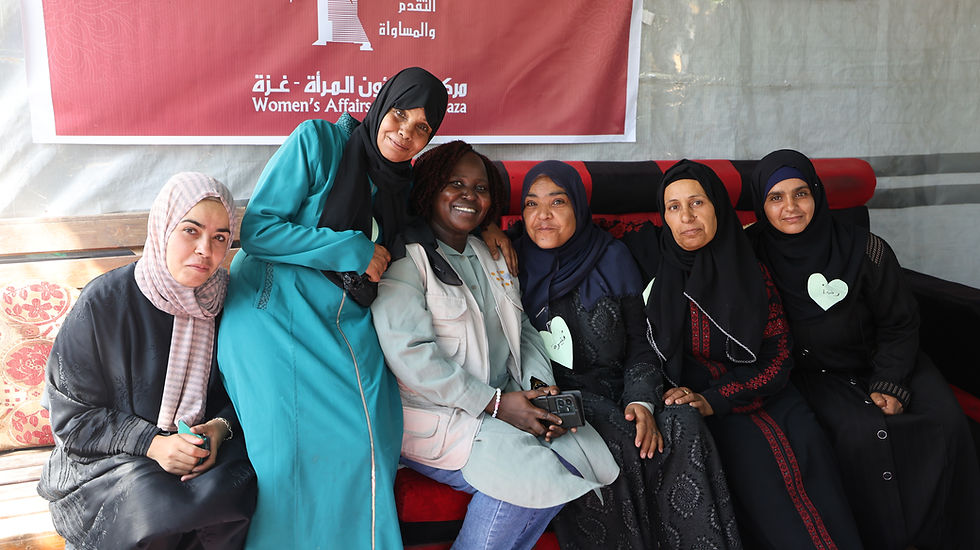Heard Voices: Food assistance in times of need!
- Standby Partnership Network

- Oct 29, 2025
- 3 min read

In a packed community hall in northern Uganda, Rolf Lienekogel and his colleagues faced one of the hardest conversations of their careers. Refugee leaders sat across from them, waiting to hear why food rations were being slashed—again. Some asked if their children would still eat. Others demanded to know why their families were no longer considered “vulnerable enough.”
“I can’t explain to a single mother of two how to find food for her children,” Rolf said. “I only know that the mother with five kids, two of whom have disabilities, will get support—while the first might not.”
These emotionally charged meetings became the centerpiece of a humanitarian reckoning in Uganda, which hosts more than 1.9 million refugees—more than any other country in Africa. While Uganda offers safety, land for farming, food insecurity remains widespread. Climate change has brought erratic rains, droughts, and floods, worsening conditions for both refugees and host communities.
In July 2024, Rolf was deployed by Germany’s Centre for International Peace Operations (ZIF) to support the World Food Programme (WFP) Uganda in scaling up cash-based assistance. But his mission quickly shifted. By January 2025, news broke that major donors were pulling back, forcing WFP to reduce food aid for over 1.6 million refugees.
Rolf was tasked with leading a categorization exercise to determine the most vulnerable people that would receive support based on very limited funding available. “The first and absolute most important thing is listening to my colleagues and stakeholders,” he said. “Even if I’ve done this work before, Uganda’s context is different. The refugees come from many countries, and the history of aid here is unique.”
The joint WFP-UNHCR effort, coordinated with the Ugandan government, refined vulnerability criteria and developed a communication strategy. But time ran out. By May 2025, the number of refugees receiving food aid had to be cut to 662,000—a dramatic reduction by 64%, expected to deepen hunger and malnutrition.
Transparency in the approach and process became essential. Rolf and his colleagues had many meetings with refugee leaders, community groups, and national authorities. They explained the funding shortfall, the criteria, and the appeals process for those who felt wrongly excluded.
“We were very transparent,” he said. “It was important to have these conversations, though they weren’t easy. My priority was to ensure the scarce resources reached those most in need.”
An appeals mechanism was established, allowing refugees to challenge their categorization. Every appeal would be reviewed, but only the most vulnerable could be re-included.
“I’m absolutely sure we did everything we could,” Lienekogel said. “in making sure what funding we have goes to those who need it most. And you hope donors will see that and step up.”
Lienekogel, seconded through the Standby Partnership, was on the ground during one of the toughest chapters in Uganda’s refugee response.
Behind Rolf's challenging work in prioritising the most vulnerable lies a broader transformation in how WFP Uganda delivers humanitarian assistance. In 2024, WFP scaled up cash-based transfers (CBT) from 61% to 73% of refugee beneficiaries—reaching over 1 million refugees with USD 43 million in cash assistance.
This shift empowered families like those Rolf met to make their own choices about food and essential needs while stimulating local markets. The programme expanded digital financial inclusion, with mobile money access jumping from 1% to 18% of beneficiaries. WFP trained over 85,000 refugees in financial literacy, helping them build savings and start small businesses.
Even as funding cuts forced painful reductions in who received assistance, the innovation in how assistance was delivered gave recipients greater dignity, choice, and pathways toward self-reliance - the very outcomes that made Rolf's difficult categorisation work meaningful.

Lienekogel, who previously led similar efforts in Jordan, said that working directly with colleagues in Kampala and in the field was critical to coordinating the response. “It was essential to be in Uganda in person,” he said. “To build trust with colleagues and stakeholders, bring the team together, drive what had to be done and deliver our best—even when the answers weren’t easy.”
For Uganda’s refugees, long-term solutions lie beyond food aid. They want access to land, farming support, and help navigating climate challenges to become self-reliant.




Comments